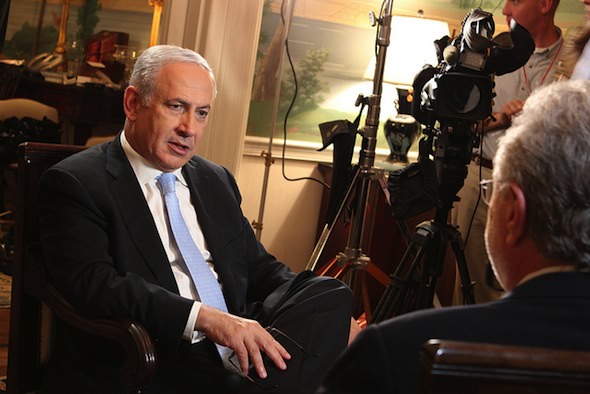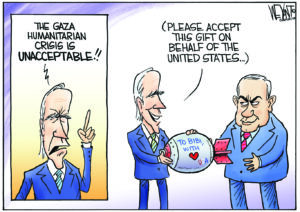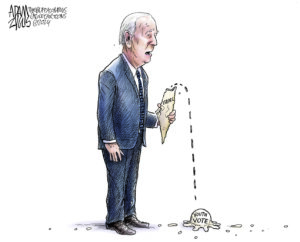A Pollster Strategy Sheet Is Helping Israelis Hide Facts, Writer Argues
Israeli spokesmen are working from a secret PR playbook to "influence the media and public opinion" on their bloody military campaign on the Gaza Strip, Middle East correspondent Patrick Cockburn contends at The Independent.
Israeli spokesmen are working from a secret PR playbook to “influence the media and public opinion” on their bloody military campaign on the Gaza Strip and the larger ongoing occupation of the West Bank, Middle East correspondent Patrick Cockburn writes at The Independent.
The “professional, well-researched and confidential” study was written by “expert Republican pollster and political strategist Dr Frank Luntz” under commission from a group called “The Israel Project, with offices in the US and Israel, for use by those ‘who are on the front lines of fighting the media war for Israel’,” Cockburn notes.
He writes:
Every one of the 112 pages in the booklet is marked “not for distribution or publication” and it is easy to see why. The Luntz report, officially entitled “The Israel project’s 2009 Global Language Dictionary, was leaked almost immediately to Newsweek Online, but its true importance has seldom been appreciated. It should be required reading for everybody, especially journalists, interested in any aspect of Israeli policy because of its “dos and don’ts” for Israeli spokesmen.
These are highly illuminating about the gap between what Israeli officials and politicians really believe, and what they say, the latter shaped in minute detail by polling to determine what Americans want to hear. Certainly, no journalist interviewing an Israeli spokesman should do so without reading this preview of many of the themes and phrases employed by Mr Regev and his colleagues.
Among the copious instructions is advice to avoid talking about border lines drawn in certain years, to cast the return of Palestinians to Israel as “mass Palestinian immigration,” and to “Show Empathy for BOTH sides!” as “Persuadables [sic] won’t care how much you know until they know how much you care.”
About a particularly devious and evasive recommendation, Cockburn states:
There is a list of words and phrases to be used and a list of those to be avoided. Schmaltz is at a premium: “The best way, the only way, to achieve lasting peace is to achieve mutual respect.” Above all, Israel’s desire for peace with the Palestinians should be emphasised at all times because this what Americans overwhelmingly want to happen. But any pressure on Israel to actually make peace can be reduced by saying “one step at a time, one day at a time”, which will be accepted as “a commonsense approach to the land-for-peace equation”.
Dr Luntz cites as an example of an “effective Israeli sound bite” one which reads: “I particularly want to reach out to Palestinian mothers who have lost their children. No parent should have to bury their child.”
Cockburn contends that the study acknowledges that Israel doesn’t really want a two-state solution and that this should be hidden because 78 percent of Americans do want it. Later, the booklet offers a public statement by Prime Minister Benjamin Netanyahu as an example — it is “time for someone to ask Hamas: what exactly are YOU doing to bring prosperity to your people.” This is a manipulation and hypocrisy that “beggars belief,” Cockburn writes, because “it is the seven-year-old Israeli economic siege that has reduced the Gaza to poverty and misery.”
Cockburn concludes:
On every occasion, the presentation of events by Israeli spokesmen is geared to giving Americans and Europeans the impression that Israel wants peace with the Palestinians and is prepared to compromise to achieve this, when all the evidence is that it does not. Though it was not intended as such, few more revealing studies have been written about modern Israel in times of war and peace.
Read more here.
— Posted by Alexander Reed Kelly.
Your support matters…Independent journalism is under threat and overshadowed by heavily funded mainstream media.
You can help level the playing field. Become a member.
Your tax-deductible contribution keeps us digging beneath the headlines to give you thought-provoking, investigative reporting and analysis that unearths what's really happening- without compromise.
Give today to support our courageous, independent journalists.






You need to be a supporter to comment.
There are currently no responses to this article.
Be the first to respond.